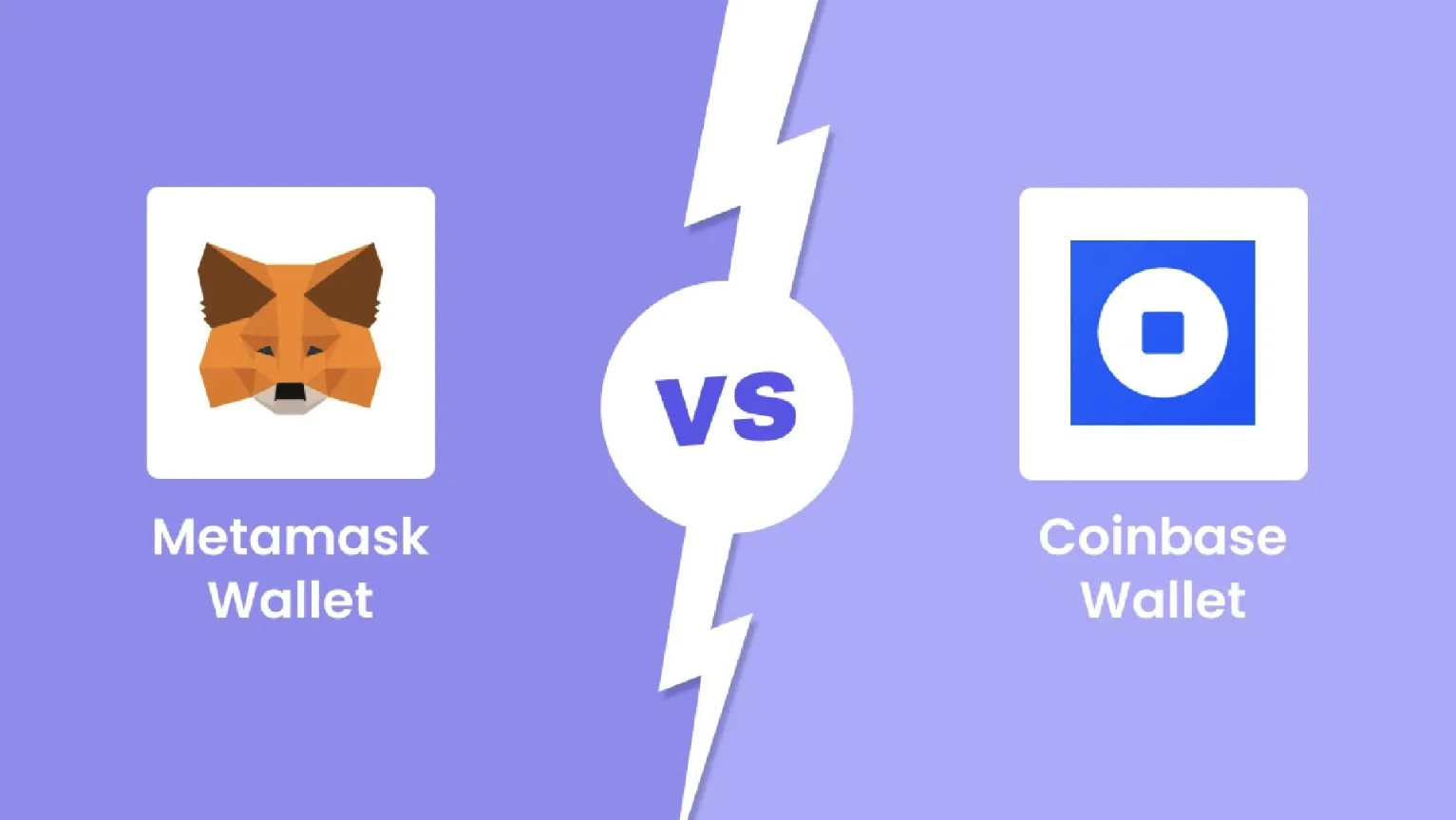Choosing between Coinbase Wallet vs MetaMask can be tricky. Both are top-notch, but they have their unique perks. MetaMask shines with Ethereum and dApps, while Coinbase Wallet supports more crypto types and offers a user-friendly interface.
This comparison dives into their features, security, and fees, helping you pick the best wallet for your crypto journey. It’s a must-read for anyone in the crypto world, whether you’re a newbie or a pro.
Introduction to Crypto Wallets
Crypto wallets, like MetaMask and Coinbase Wallet, are essential in the digital currency world. They’re either software or hardware, letting you store and use cryptocurrency.
Unlike traditional wallets with physical cash, crypto wallets deal with digital assets on the blockchain.
They show how much crypto you own and let you send or receive digital money. Crypto wallets are key for managing crypto assets and connecting with decentralized apps (dApps).
The Role of Crypto Wallets in DeFi and NFTs

Crypto wallets are crucial in DeFi (Decentralized Finance) and NFTs (Non-Fungible Tokens). They manage your crypto balance and enable transactions.
More importantly, they’re needed to interact with Web 3.0 dApps. Wallets use a username linked to a public key on the blockchain, making transactions secure and easy.
Differences Between Blockchain Wallets and Conventional Wallets
Blockchain wallets differ from conventional wallets in several ways. They don’t store physical currency but hold private keys to access the blockchain. With a traditional bank, you have an account number; in crypto, the public key is similar.
But you need a private key to make transactions, just like a PIN for a bank account. Crypto wallets keep your private key safe, while public keys are on the blockchain. This combo allows secure operations and cryptocurrency transactions.
Overview of MetaMask
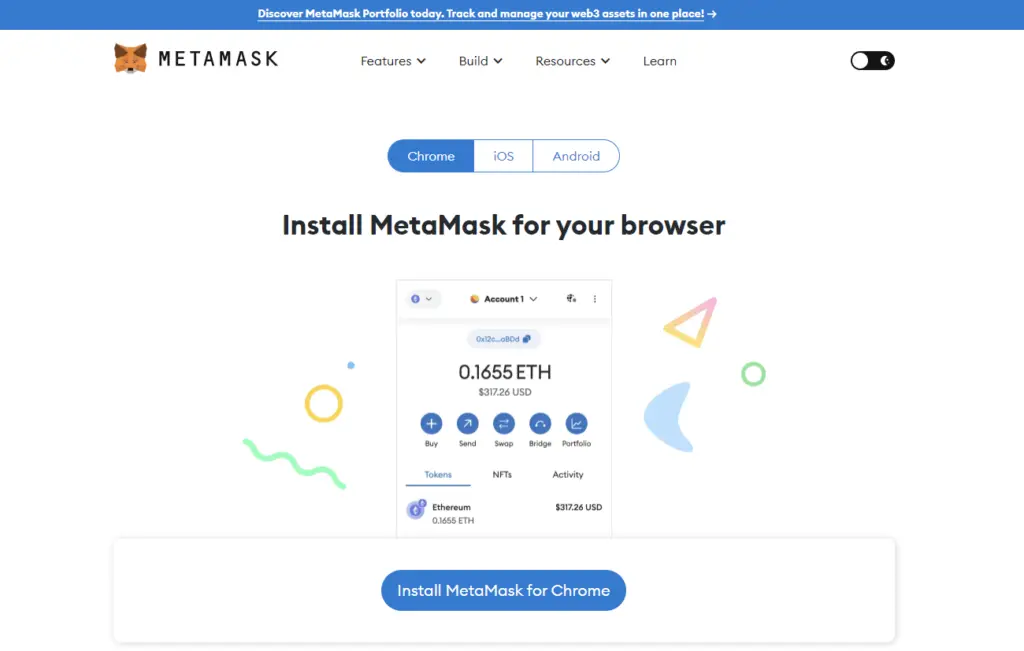
MetaMask is a standout in the world of cryptocurrency wallets, specifically designed for Ethereum-based tokens. It’s a go-to choice for those diving into the Ethereum blockchain, offering both a browser extension and a mobile app.
This wallet is not just about storing crypto; it’s a gateway to buying, selling, swapping coins, and accessing decentralized applications (dApps).
Evolution and Features of MetaMask
MetaMask started as a simple browser extension and has evolved into a comprehensive tool for Ethereum enthusiasts. It’s a hot wallet, meaning it’s always connected online, but it also integrates with cold storage devices like Trezor and Ledger for added security.
The wallet supports a vast array of ERC-20 tokens and provides direct access to dApps, including staking tools and NFT marketplaces.
Users appreciate the flexibility of purchasing with various methods, including ACH transfers, card payments, and digital wallets like PayPal.

Pros and Cons of Using MetaMask
Pros:
- MetaMask is an open-source platform, allowing users and developers to verify its security.
- It supports a wide range of Ethereum-based tokens and dApps.
- The wallet offers easy integration with hardware wallets for enhanced security.
- It has a user-friendly mobile app and browser extension, though it lacks a desktop application.
Cons:
- MetaMask is limited to Ethereum and ERC-20 tokens, so it’s not suitable for those looking to store non-Ethereum assets like Bitcoin.
- The wallet doesn’t use two-factor authentication or multisignature access, which could be seen as a downside in terms of security.
MetaMask stands out for its specific focus on the Ethereum blockchain, making it an ideal choice for users deeply invested in Ethereum-based assets. Its open-source nature and integration with hardware wallets offer a balance of accessibility and security.
However, its limitation to Ethereum tokens and lack of certain security features might prompt users to look elsewhere for more diverse or secure storage options.
Also read: 7 Best Cardano Wallets in 2024 for Ultimate Security and Ease
Overview of Coinbase Wallet
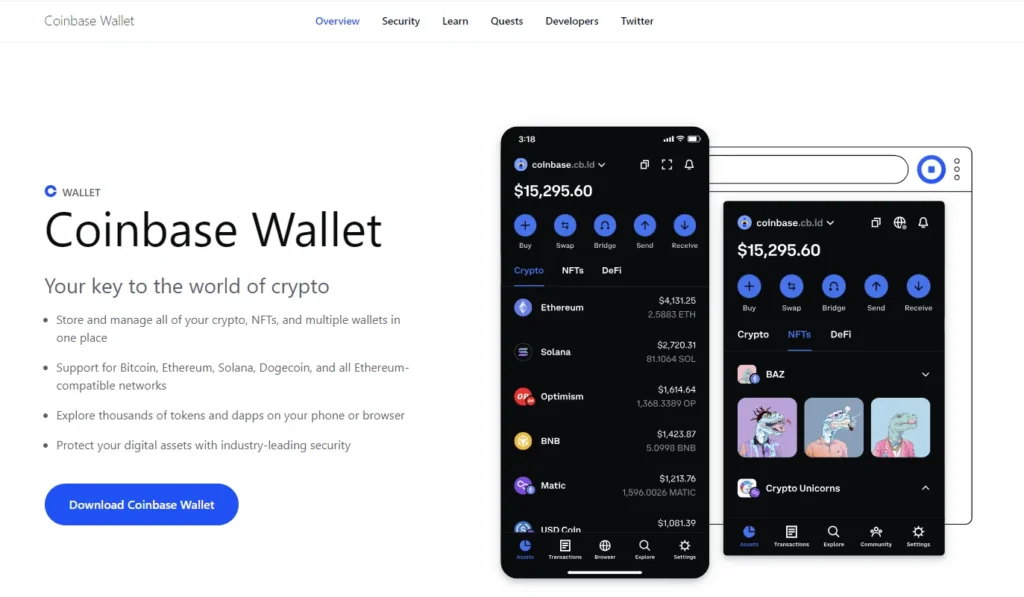
Coinbase Wallet stands out as a versatile and user-friendly option in the cryptocurrency wallet landscape. Designed as a non-custodial wallet, it offers a secure way to store a vast array of digital assets, explore decentralized applications, and manage Ethereum and Polygon-based NFTs.
Key Features and Security of Coinbase Wallet
Coinbase Wallet supports an impressive range of over 100,000 cryptocurrencies, including popular ones like Bitcoin, Ethereum, and Polygon. It’s available as both a mobile app for Android and iOS users and a desktop version, providing flexibility for different user preferences.
The wallet allows for easy asset transfers using usernames instead of complex addresses, simplifying the process of sending and receiving cryptos and NFTs.
In terms of security, Coinbase Wallet is a self-custodial wallet, meaning only the user has access to their crypto. This approach ensures that in the event of a hack on Coinbase’s servers, user funds remain safe.
The wallet emphasizes security by requiring biometrics or a passcode during mobile setup and a password for the browser extension. Additionally, it offers high privacy levels, as no personal information is needed to use the wallet.
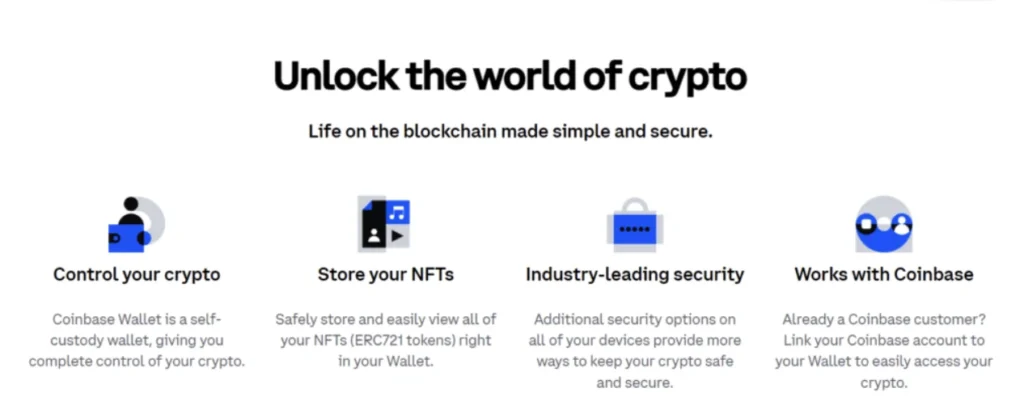
Pros and Cons of Using Coinbase Wallet
Pros:
- Easy download and setup process, making it accessible for beginners.
- Simplified app layout for effortless navigation.
- Supports a huge number of cryptocurrencies, providing versatility.
- Easy to transfer assets with the innovative username feature.
- Offers staking and earning interest on crypto holdings.
Cons:
- Customer support has been reported as below average, with long wait times.
- High transaction fees, particularly for trading and swapping assets.
- Limited support for NFTs, currently restricted to Ethereum and Polygon NFTs.
Coinbase Wallet is an excellent choice for users seeking a secure, non-custodial wallet with extensive cryptocurrency support.
Its user-friendly interface and innovative features like username-based transfers make it a strong contender in the wallet market. However, users should be aware of the high transaction fees and limited NFT support.
User Experience and Beginner Friendliness
When it comes to user experience and beginner friendliness, both MetaMask and Coinbase Wallet have made significant strides. They are designed to cater to users who are new to the world of cryptocurrencies and decentralized applications (dApps).
Ease of Use for Beginners in MetaMask and Coinbase Wallet
MetaMask, initially a simple browser extension, has evolved into a user-friendly platform ideal for beginners. It’s known for its ease of use, especially in interacting with the Ethereum blockchain and dApps.
The wallet is available on popular browsers and as a mobile app, making it accessible on various devices. Its integration with token swapping directly in the app simplifies transactions for users.
Coinbase Wallet, on the other hand, offers a decentralized self-custody wallet that’s also beginner-friendly. It’s accessible from mobile devices and integrates seamlessly with the main Coinbase app, providing an easy transition to self-custody for users of the Coinbase platform.
The wallet supports a wide range of cryptocurrencies, including Bitcoin, Ethereum, and ERC20 tokens, making it versatile for beginners who wish to explore different digital assets.
Also Read: 8 Best Tron Wallet in 2024: Unleash the Power of Your TRX
KYC Processes and User Accessibility
One of the key aspects that make both MetaMask and Coinbase Wallet appealing to beginners is the lack of a stringent Know Your Customer (KYC) process. Users can download the app and start using it without undergoing a complex verification process.
This feature significantly lowers the barrier to entry for new users who want to manage their digital assets without the hassle of lengthy verifications.
Trust and Security Aspects
In the realm of cryptocurrency wallets, trust and security are paramount. MetaMask and Coinbase Wallet, both leading names in this space, offer robust security features to protect users’ digital assets.
Security Features in MetaMask and Coinbase Wallet
MetaMask, primarily an Ethereum-focused wallet, is non-custodial and open-source, allowing users to have full control over their private keys. This feature enhances security, as users are solely responsible for their assets.
MetaMask’s integration with popular browsers and its mobile app version adds to its accessibility while maintaining security. Despite being a hot wallet, MetaMask can integrate with cold wallets like Ledger Nano, adding an extra layer of security by storing the seed phrase offline.
Coinbase Wallet, designed with a focus on safety and privacy, is also a decentralized self-custody wallet. It encrypts the user’s private key on their device, ensuring that Coinbase cannot access or decrypt the wallet without the user’s password.
This approach significantly enhances the security of the wallet. Although Coinbase Wallet is a hot wallet, its design by Coinbase’s world-leading exchange team adds a layer of trust and reliability.
Integration with Hardware Wallets and Insurance Coverage
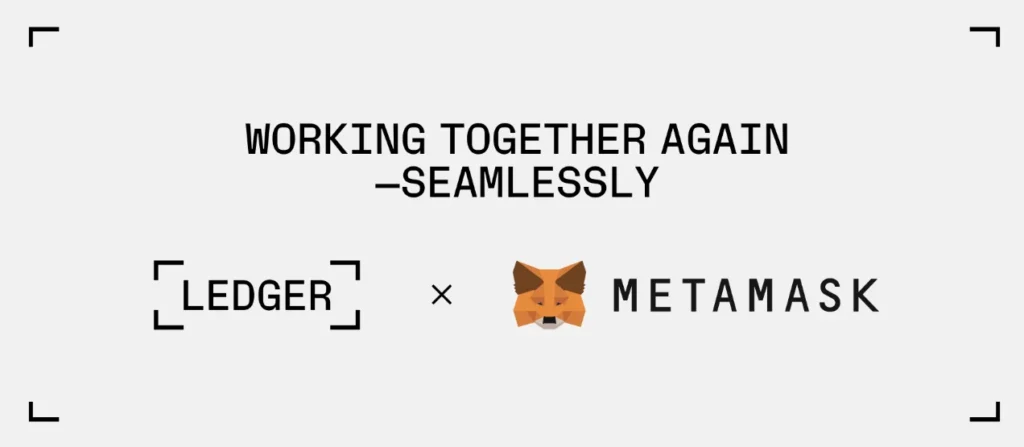
Both MetaMask and Coinbase Wallet offer integration with hardware wallets. MetaMask’s ability to connect with devices like Ledger Nano provides users with the option to secure their assets in cold storage. This integration is crucial for users who prefer an additional security layer beyond the digital realm.
Coinbase Wallet users can leverage the main Coinbase exchange platform to store a majority of their funds, benefiting from the insurance coverage provided by Coinbase. This feature is particularly appealing to users who want the assurance of asset protection in case of unforeseen circumstances like exchange hacks.
Supported Cryptocurrencies and Compatibility
MetaMask and Coinbase Wallet, two prominent players in the crypto wallet space, offer varied support for cryptocurrencies and compatibility with different blockchains and decentralized applications (dApps).
Range of Supported Cryptocurrencies in Both Wallets
MetaMask, initially tailored for the Ethereum ecosystem, primarily supports Ether (ETH) and ERC20 tokens. This focus makes it an ideal choice for users who are heavily invested in the Ethereum network and its associated tokens.
MetaMask’s evolution into a full-fledged platform includes an in-built coin-swapping mechanism, allowing users to exchange ERC20 tokens within the DeFi ecosystem without visiting a decentralized exchange (DEX).
Coinbase Wallet, on the other hand, supports a broader range of cryptocurrencies. In addition to Ethereum and ERC20 tokens, it also supports Bitcoin, Bitcoin Cash, Litecoin, Ethereum Classic, Stellar Lumens, XRP, Dogecoin, and many other digital assets. This extensive support makes Coinbase Wallet a more versatile option for users who deal with various cryptocurrencies.
Compatibility with Different Blockchains and dApps
MetaMask’s compatibility is primarily with the Ethereum blockchain, making it a preferred choice for users who engage with Ethereum-based dApps. Its integration with Ethereum’s blockchain allows seamless interaction with a wide array of dApps hosted on the network.
Coinbase Wallet stands out with its ability to seamlessly integrate with dApps. It features a dApps browser, providing users a gateway to interact with various dApps without needing to authorize every transaction. This feature enhances the user experience, especially for those who frequently use dApps for various purposes.
Standout Features and Unique Offerings
MetaMask and Coinbase Wallet each bring their own unique features to the table, making them stand out in the crowded field of cryptocurrency wallets.
Unique Features of Coinbase Wallet
- Decentralized Self-Custody Wallet: Ensures users have full control over their private keys.
- Broad Cryptocurrency Support: Supports a wide range of cryptocurrencies, including Bitcoin, Ethereum, and many ERC20 tokens.
- Built-in dApp Browser: Provides easy access to a variety of decentralized applications.
- Client-Side Encryption: Enhances security by encrypting the private key on the user’s device.
- Integration with Coinbase Exchange: Allows for seamless use with Coinbase’s exchange services.
- Mobile App Availability: User-friendly mobile apps for both Android and iOS platforms.
Distinctive Capabilities of MetaMask
- Ethereum Ecosystem Integration: Specifically designed for Ethereum, making it ideal for users of this blockchain.
- Token Swapping Feature: Allows users to easily swap tokens within the app.
- Browser Extension and Mobile App: Available as both a browser extension and a mobile application.
- Open-Source Software: Ensures transparency and community involvement in development.
- Hardware Wallet Integration: Compatible with hardware wallets like Ledger Nano for added security.
- Active User Community: Boasts a large and engaged user base, particularly among Ethereum enthusiasts.
Both MetaMask and Coinbase Wallet offer features that cater to different user needs, with MetaMask focusing on the Ethereum ecosystem and Coinbase Wallet providing a more versatile platform supporting various cryptocurrencies and dApps.
Coinbase Wallet vs MetaMask Fees Comparison
Understanding the fee structures of Coinbase Wallet and MetaMask is crucial for users to make informed decisions. Let’s delve into how these wallets handle fees for their services.
Fee Structures in MetaMask and Coinbase Wallet
- MetaMask Fees: MetaMask primarily charges fees for token swaps within the app. These fees are not set by MetaMask itself but are determined by the network conditions of the Ethereum blockchain. Users need to pay gas fees for transactions, which can vary based on network congestion.
- Coinbase Wallet Fees: Coinbase Wallet charges fees for transactions, but these are network fees associated with the blockchain being used and are not set by Coinbase. For trading and swapping assets within the wallet, additional fees apply. Coinbase Wallet also charges a service fee of 2% per transaction and a 5% recovery fee.
Cost-Effectiveness for Transactions and Swaps
- MetaMask: While MetaMask provides a convenient platform for Ethereum users, the cost-effectiveness of transactions can be impacted by Ethereum’s network congestion and gas fees. Users need to be aware of fluctuating gas prices, which can affect the overall cost of transactions.
- Coinbase Wallet: Coinbase Wallet’s fees for trading and swapping can be considered relatively decent. However, users should be mindful of the additional costs that come with these services. The wallet’s integration with the Coinbase exchange can offer more competitive rates, but it’s important to compare these with other platforms to ensure cost-effectiveness.
In summary, both MetaMask and Coinbase Wallet have their own fee structures, with costs primarily driven by network fees and additional charges for specific services like asset swapping. Users should consider these fees in the context of their transaction needs and the specific cryptocurrencies they are using.
Final Verdict and User Preference
When it comes to choosing between MetaMask and Coinbase Wallet, the final decision hinges on individual user preferences and specific needs.
Deciding Factors Based on User Needs
- User Experience: Both wallets are user-friendly, but MetaMask is particularly popular among Ethereum users due to its simple transaction process and active user base. Coinbase Wallet, with its seamless integration with the main Coinbase app, is ideal for those looking for an easy transition to self-custody.
- Supported Cryptocurrencies: MetaMask primarily supports Ether and ERC20 tokens, making it a go-to choice for Ethereum enthusiasts. Coinbase Wallet offers a broader range of supported cryptocurrencies, appealing to users who deal with various digital assets.
- Security Features: Both wallets provide robust security features, but MetaMask’s integration with hardware wallets like Ledger Nano adds an extra layer of security. Coinbase Wallet’s focus on safety and privacy, along with its self-custodial nature, also makes it a secure choice.
Overall Comparison and Recommendation
- MetaMask: Best suited for users who are heavily invested in the Ethereum ecosystem and prefer a wallet with a strong focus on Ethereum-based tokens and dApps.
- Coinbase Wallet: Ideal for users seeking a versatile wallet with support for a wide range of cryptocurrencies and a user-friendly interface, especially for those already using the Coinbase platform.
Ultimately, the choice between MetaMask and Coinbase Wallet depends on the user’s specific requirements, such as the type of cryptocurrencies they hold, their preferred blockchain ecosystem, and their need for security features. Both wallets offer distinct advantages, making them suitable for different types of users in the cryptocurrency community.
FAQs and Common Queries
What wallet is better than MetaMask?
There are several wallets like Ledger Nano X and Trezor that offer different features and security levels.
Can I use the same wallet for Coinbase and MetaMask?
You can import your Coinbase Wallet account into MetaMask but not a Coinbase.com exchange account.
Is Coinbase wallet a good wallet?
Yes, it’s known for its user-friendly interface and robust security features.
What are the best crypto wallets?
The best wallets vary based on user needs, including Ledger Nano X, Trezor, MetaMask, and Coinbase Wallet.
Is Coinbase wallet extension safe?
Yes, the Coinbase Wallet extension is designed with security in mind.
Article Sources
At UncryptoNote, we prioritize accuracy and integrity in our content. Our writers are required to utilize primary sources to substantiate their work. This includes white papers, government data, firsthand reporting, and interviews with experts in the industry. We also incorporate original research from other credible publishers when relevant. This rigorous approach ensures that we deliver content that is both precise and impartial.
